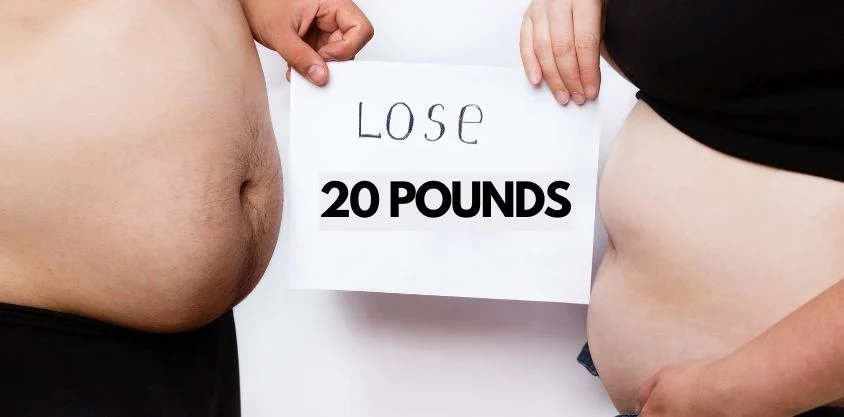Losing 20 pounds in one month is a big goal, and while it’s tough, it can be done with the right steps. You don’t need to do anything extreme or unhealthy to make it happen. Instead, you can lose weight naturally by eating well, exercising, and making small but important changes to your daily habits. Let’s explore some easy ways you can work towards losing 20 pounds in a healthy way.
1. Set Realistic Goals
Before starting, it’s important to set a goal that makes sense for you. Losing 20 pounds is a large goal, and while it is possible, not everyone can do it quickly. The healthier and slower way to lose weight is around 1 to 2 pounds per week. This helps ensure you don’t harm your body. If you want to lose more weight faster, make sure you stay healthy and check with a doctor or adult before making big changes.
2. Eat the Right Foods
Eating healthy foods is one of the most important parts of losing weight. You want to give your body good, natural foods that give you energy and keep you full, so you don’t snack on unhealthy things. Here are some tips:
A. Avoid Junk Food
Foods like chips, candy, and fast food might taste good, but they’re filled with unhealthy fats and sugars. They don’t give your body the nutrients it needs. Instead, eat foods like fruits, vegetables, lean meats (like chicken), and healthy fats (like nuts or avocados). These will keep you full longer and help you feel better.
B. Eat Fewer Carbs
Carbohydrates, or “carbs,” are found in foods like bread, pasta, and rice. Eating too many carbs can cause your body to store fat. Try eating whole grains like brown rice and quinoa, and limit sugary foods like candy and soda.
C. Eat More Protein
Protein helps your body build muscles and keeps you full, which means you won’t feel hungry as quickly. Foods like chicken, eggs, fish, beans, and nuts are good sources of protein.
D. Add Fiber
Fiber is found in foods like fruits, vegetables, and whole grains, and it helps your body digest food properly. It also helps keep you full, which is important for losing weight.
E. Try Intermittent Fasting
Intermittent fasting is when you only eat during certain times of the day and fast (or don’t eat) the rest of the time. Some people choose to eat all their meals in an 8-hour window and fast for the other 16 hours. This helps your body burn fat more easily.
3. Exercise Regularly
Exercise is another big part of losing weight. You need to move your body to burn off extra calories. The more calories you burn, the more weight you can lose. Here are some exercises that can help:
A. High-Intensity Interval Training (HIIT)
HIIT workouts involve short bursts of really hard exercise, followed by a quick rest. For example, you might do 30 seconds of jumping jacks as fast as you can, rest for 30 seconds, and repeat. This helps you burn a lot of fat in a short amount of time.
B. Strength Training
Strength training means using weights or your own body weight to build muscles. When you build more muscle, your body burns more calories, even when you’re resting. Try doing exercises like squats, push-ups, and lunges.
C. Cardio Exercises
Cardio, or aerobic exercise, includes activities like running, swimming, cycling, or even brisk walking. Cardio helps your heart stay strong and burns a lot of calories, which helps you lose weight faster. Aim to do cardio for at least 30 minutes a day.
D. Move Throughout the Day
Aside from working out, try to stay active during the day. Take the stairs instead of the elevator, go for a walk after dinner, or help with chores around the house. Little movements throughout the day add up to burn more calories.
4. Drink Plenty of Water
Drinking water is super important when you’re trying to lose weight. Water helps your body stay hydrated and also helps burn fat. Sometimes when you feel hungry, you might just be thirsty. Try drinking a glass of water before meals to help you feel full, and aim to drink 8-10 glasses a day.
5. Get Enough Sleep
Sleep is just as important as eating right and exercising. When you don’t get enough sleep, your body produces more of a hormone that makes you feel hungry. You’re also more likely to crave unhealthy foods when you’re tired. Make sure you get 7-9 hours of sleep each night to help your body rest and recover.
6. Manage Stress
When you’re stressed out, your body releases a hormone called cortisol, which can cause you to gain weight, especially in your belly area. Stress can also make you want to eat more, especially sugary or fatty foods. Find ways to relax and manage stress, like going for a walk, reading a book, or practicing deep breathing exercises.
7. Track Your Progress
Tracking your progress can help keep you motivated. You can use a notebook or a mobile app to record your meals, workouts, and changes in your weight. Seeing your progress over time can remind you that your hard work is paying off. But remember, your weight can change from day to day for different reasons, so focus on how you’re improving over a longer period instead of daily changes.
Conclusion
Losing 20 pounds in a month is a big challenge, but it’s possible if you make healthy choices and stick to your plan. Focus on eating good foods, staying active, drinking plenty of water, getting enough sleep, and keeping your stress levels low. Remember, losing weight should be about feeling healthy and strong, not just looking a certain way. By making these natural and healthy changes, you’ll not only lose weight but also feel better and more energetic in the long run!



